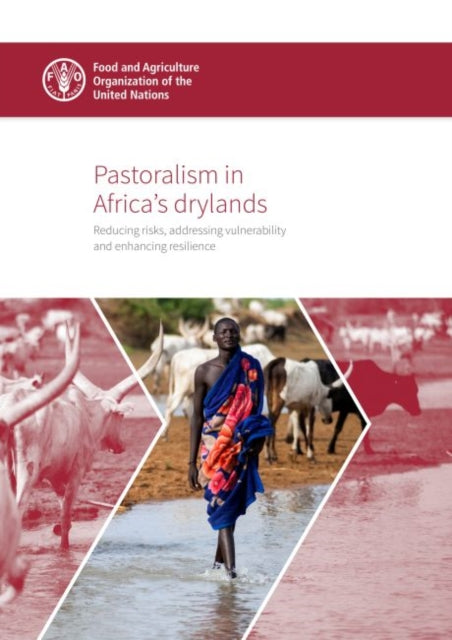Food and Agriculture Organization
Pastoralism in Africa's drylands: reducing risks, addressing vulnerability and enhancing resilience
Pastoralism in Africa's drylands: reducing risks, addressing vulnerability and enhancing resilience
YOU SAVE £3.78
- Condition: Brand new
- UK Delivery times: Usually arrives within 2 - 3 working days
- UK Shipping: Fee starts at £2.39. Subject to product weight & dimension
Bulk ordering. Want 15 or more copies? Get a personalised quote and bigger discounts. Learn more about bulk orders.
Couldn't load pickup availability
- More about Pastoralism in Africa's drylands: reducing risks, addressing vulnerability and enhancing resilience
This report investigates the vulnerability of pastoralism and suggests policy interventions, resilience programming, and research areas to enhance its resilience. Pastoralism is a significant livelihood system in Africa, covering 36 countries and 268 million pastoralists, and it has evolved as an adaptation to a changing arid climate.
\n Format: Paperback / softback
\n Length: 47 pages
\n Publication date: 01 April 2019
\n Publisher: Food & Agriculture Organization of the United Nations (FAO)
\n
This comprehensive report delves into the intricate realm of pastoralism, shedding light on its current state of vulnerability. It provides a comprehensive framework for understanding the multifaceted challenges faced by pastoral communities and offers potential solutions to enhance their resilience.
Pastoral livestock production is a significant livelihood system in Africa, accounting for 43 percent of the continent's land mass. In certain regions, it dominates the economic landscape, serving as the primary means of sustenance for millions of people. Spanning across 36 countries, from the Sahelian West to the expansive rangelands of Eastern Africa and the Horn, as well as the nomadic populations of Southern Africa, pastoralism encompasses an estimated 268 million pastoralists.
The origins of pastoralism can be traced back 7000 years, when it emerged as a response to the rapidly changing and unpredictable arid climate of Northern Africa. It has since evolved into a resilient and adaptive way of life, allowing pastoral herds to navigate the varying climatic conditions throughout the year. By utilizing drier areas during the wet season and more humid regions during the dry season, pastoralism ensures the availability of high-quality grazing for livestock, thereby contributing to economic prosperity.
However, pastoralism faces numerous challenges that threaten its sustainability. These challenges include land degradation, resource competition, climate change, and political instability. Land degradation, driven by factors such as overgrazing, deforestation, and desertification, has led to a decline in the productivity of grazing lands, reducing the availability of forage for livestock. Resource competition, particularly over water and grazing resources, can lead to conflict and tensions between different pastoral communities. Climate change, with its unpredictable patterns of rainfall and temperature, poses a significant threat to pastoral livelihoods, as it affects the availability and quality of grazing resources. Political instability, often characterized by conflict and violence, can disrupt pastoral communities' access to resources, markets, and social services, further exacerbating their vulnerability.
To address these challenges and enhance the resilience of pastoral livelihoods systems, a range of policy interventions, resilience programming, and research areas need to be explored. Policy interventions can focus on improving land management practices, promoting sustainable resource use, and fostering peaceful conflict resolution. Resilience programming can include initiatives that enhance access to education, healthcare, and financial services, as well as training programs that promote sustainable livelihood practices and adaptive capacity. Research areas can focus on understanding the dynamics of pastoralism, developing innovative technologies and practices that support sustainable livestock production, and exploring the role of pastoralism in climate change adaptation and mitigation.
In conclusion, pastoralism is a complex and dynamic livelihood system that plays a critical role in the economies and cultures of Africa. While it faces numerous challenges, there are opportunities to enhance its resilience and promote sustainable development. By implementing policy interventions, resilience programming, and research efforts, we can work towards a future where pastoral communities can thrive in the face of adversity.
\n Weight: 248g\n
Dimension: 211 x 297 x 3 (mm)\n
ISBN-13: 9789251308981\n \n
This item can be found in:
UK and International shipping information
UK and International shipping information
UK Delivery and returns information:
- Delivery within 2 - 3 days when ordering in the UK.
- Shipping fee for UK customers from £2.39. Fully tracked shipping service available.
- Returns policy: Return within 30 days of receipt for full refund.
International deliveries:
Shulph Ink now ships to Australia, Belgium, Canada, France, Germany, Ireland, Italy, India, Luxembourg Saudi Arabia, Singapore, Spain, Netherlands, New Zealand, United Arab Emirates, United States of America.
- Delivery times: within 5 - 10 days for international orders.
- Shipping fee: charges vary for overseas orders. Only tracked services are available for most international orders. Some countries have untracked shipping options.
- Customs charges: If ordering to addresses outside the United Kingdom, you may or may not incur additional customs and duties fees during local delivery.


